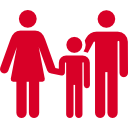
On the extent, which changes from the EITC are required to continue more than many idiosyncratic shocks to household earnings, our instrumental variables quotes ought to be more compared to normal OLS and adjusted effect quotes (visit Dahl and Lecher 2005). This paper continues as follows. Within the upcoming section, we offer a concise literature assessment. Segment II discusses our plan to estimating the impact of household income on child results. Then we Talk about the information and record that the big adjustments from the EITC at Segment III. Department IV offers estimates of this influence of earnings on reading and mathematics test scores, and for example consequences from an assortment of robustness tests and specifications. Area V concludes. An expanding empirical literature queries how poverty has an effect on a youngster's wellbeing and if income support apps may enhance a youngster's life opportunities.
Proof on the point to which family member’s income impacts baby progress is, blended yet. Previous scientific studies differ from statistics, processes, and research, as talked about at the selection of research workers from Duncan and so Brooks Gunn (1997) and also both the studies from Hageman and Wolfe (1995) and Mayer (1997). Scientists have given numerous, explanations for the reason why loved ones income could influence child progress. To begin with, poverty is, related to high quantities of parental worry, depressive disorders, and bad wellness states, which may negatively influence parents capability to cultivate their kids (see, e.g., McLeod 1990). As an instance, at 1998, 28 percentage of kindergartners surviving in poverty experienced a mother or father in danger for depressive disorders, in contrast to 14 percentage for some other kindergartners (Child Trends and Center for Child Health Research 2004).
Income parents additionally report a greater degree of disappointment and annoyance by making use of their kids, and such kids are somewhat more inclined to possess inferior verbal advancement and demonstrate high rates of distractibility and hostility from the classroom (Parker et al. 1999). Two new documents look at income transport apps in Canada along with also the US in order to detect signs that cash flow transports strengthen a household's psychological wellbeing. Milligan and Stabile (2011) detect significant favorable consequences on reported maternal and child emotional wellbeing, also Evans and Garth Waite (2010) come across lesser rates of reported maternal tension and also a reduction at the chances of high risk heights of both biomarkers linked with strain. Extra loved ones income could even matter whether parents utilize the amount of money for child, centered merchandise such as novels, such as quality preschool or preschool apps, to get better reliant wellness treatment, or even to maneuver into a far better locality.
Right up until lately, empirical scientific studies linking poverty and cash flow into child impacts have achieved very little to expel biases resulting from the omission of both unobserved child and family faculties. Most scientific studies apply regressions of a consequence factor (for example, scholastic accomplishment) on a certain degree of household earnings plus also a pair of visible loved ones, youngster, and local traits. When these scientific studies show the correlations between income and child results, they do not of necessity gauge a causal connection, since Mayer (1997), Duncan and Brooks Gunn (1997), along with many others have stated. Kids residing in very poor families can get a worse dwelling natural environment or alternative faculties, which the researcher does not see. These omitted factors might be a portion of this main reason behind insufficient accomplishment and can proceed to have an effect on youngster’s improvement even when household income should happen to grow.
